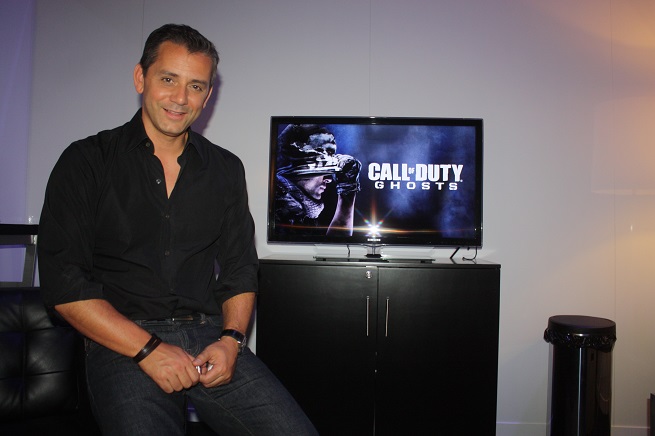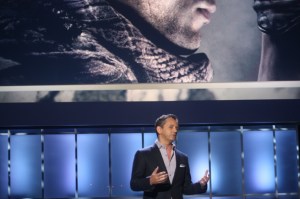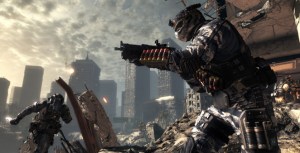Activision keeps doubling down on Call of Duty, and so far, it has been paying off in rising sales every year for the fastest-selling video game franchise. Ten million people are playing Call of Duty every day. This year, the company fully expects them to begin playing Call of Duty: Ghosts starting Nov. 5.
Eric Hirshberg, president and chief executive of Activision Publishing, a division of Activision Blizzard, brushes off questions about whether gravity will eventually pull down sales. This year, there’s more competition than ever: Battlefield 4 will be arriving from rival Electronic Arts. New game consoles that will also suck the money out of consumer wallets are also coming this fall.
So what is Hirshberg going to do? He’s doubling down, of course, starting with this week’s splashy multiplayer revelation event (see our Ghosts preview here) in downtown Los Angeles, where we caught up with him. Here is an edited transcript of our interview.
GamesBeat: What feedback are you getting about your multiplayer event?
Hirshberg: The response seems good. I’ve been checking our social media channels and talking to a few journalists. People are very positive. That’s one thing that’s great about social media. It’s not scientific, but you get a feeling for how things are being received. People were impressed with the way the game looked. That’s the most noticeable difference with the new engine and the next-gen hardware. It’s the most beautiful multiplayer game we’ve ever made.
I see two things getting the most traction. One, the dynamic maps — people are interested in trying that and seeing how it changes the game. They’re not just novelty events within the maps, something cosmetic. They change the flow of the map. They change the access points. A lot of them are under the player’s control.
GamesBeat: I got crushed by a falling roof in my session.
Hirshberg: It’s funny. For the live match we did with the pro players and the Marines, we chose that level – which is a beautiful level, the stadium – because one of the kill streaks is the Odin Strike, a missile from a space station that comes down and destroys the map in the middle of the game. It completely changes the landscape around you.
In every single rehearsal, someone got that perk. And of course, when we did it live no one got it. But people will see it eventually. It’s in the trailer.
The other thing people seem very curious about is the approach to second screen and the Clan Wars game. I can tell you, it’s really fun. It takes the console game and creates a whole new way to compete that’s very appropriate to a mobile device. It’s a way to stay engaged with the franchise and your friends when you’re not in front of the console.
GamesBeat: It seems like you have a better handle on mobile and integrating it into the experience.
Hirshberg: When the current generation of consoles came out, things like YouTube and Twitter and Facebook and smartphones and tablets didn’t exist. Those devices weren’t designed to interact with other devices and social platforms. Now the first parties have seen the same trends that we have, so things that we were trying to do a couple of years ago with Call of Duty Elite — which required a lot of technological gymnastics to pull off, even something as simple as pushing a character loadout from the smartphone to the console — now there are a lot more capabilities. It’s opened up the walled garden. We can take all the stats and progression into a game like Clan Wars and not only create a cool way to track your progress, but also a new way to compete.
GamesBeat: Is there any tension there, where you want to get out of the walled garden and the platforms would be happy to keep you inside it?
Hirshberg: Both Sony and Microsoft acknowledge that entertainment today needs to be connected. We’re all device omnivores today. We all access information and the entertainment we love in a variety of ways. All I can say from my vantage point is that given the way they designed the hardware, they clearly had that connectivity in mind.
GamesBeat: This event seems like a bigger unveiling than last year’s, for multiplayer.
Hirshberg: Maybe? We’ve done even bigger. We did Call of Duty XP a couple of years ago. We have a different approach every year. It’s designed around the specifics of each game.
GamesBeat: I know you mentioned in some of the analyst calls that you guys will spend more in the second half on sales and marketing, just because of all the noise and competition.
Hirshberg: It’s not only direct competition from other games. There’s also going to be a lot of marketing noise for the consoles themselves. Occupying the top spot, we have to make sure we defend our share of voice and get the message out. We’ve got an incredibly innovative and fun new Call of Duty game. It’s going to be great to play on every single platform, current generation or next generation.
GamesBeat: If you look back at last year, what worked really well for getting that message out?
Hirshberg: First of all, a great game by Treyarch. It starts and ends with game quality. The franchise took a lot of new risks, taking it into the future for the first time. A lot of new weapon mechanics, an engaging plot, a very cool multiplayer game that introduced leagues and eSports. The game itself captured people’s imaginations, and from the very beginning we had a smart marketing campaign.
One thing we’ve gotten very good at is speaking directly to our core audience. The first unveiling of Black Ops II was on an FPSRussia video on YouTube. He’s an internet star, someone who’s big within our core audience. It was a clever way to announce something, very non-traditional. It starts there and escalates through the Guy Ritchie launch commercial, which got something like 35 million views on YouTube. What we do is we try to speak to the core – let them know that we’re making a great game for them – and then we try to present this as a pop culture event.
There are people who are curious about games, or who are more casual consumers of games. We want to invite them into the franchise as well. My analogy is, a lot of people who aren’t hardcore science fiction fans went and saw the movie Avatar. We have a core audience that loves our game and that we’re focused on, but Call of Duty is one of those events each year that people want to be a part of.




